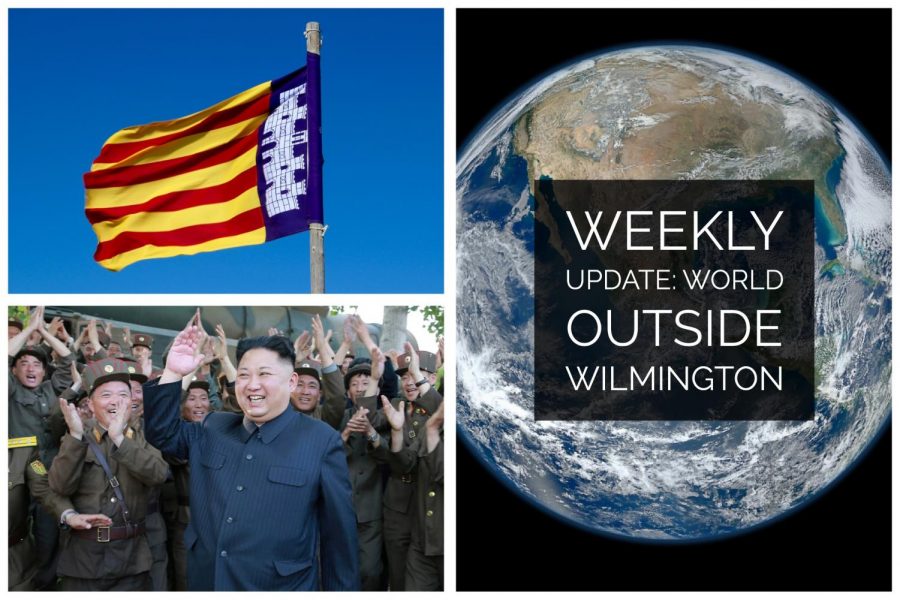Weekly update: News from the World Outside Wilmington
Catalonian independence crisis; North Korean armament; terrorism in France
This article is one out of a weekly series summarizing major events in international news by staff writer Tyler Newman.
Crisis in Catalonia
Following a referendum for independence in Catalonia, Spain, the leader of the executive branch of the Catalan government, Carles Puigdemont, states that Catalonia will declare independence in a “matter of days.” This was according to a BBC interview, which was Puigdemont’s first since the referendum.
Meanwhile, King Felipe VI of Spain stated that the organizers of the independence vote put themselves “outside of the law.”
Mass protests and violence have erupted throughout Catalonia, particularly in Barcelona, the regional capital. Thousands have taken to the streets to protest the ongoing police violence that involved clashes with demonstrators and use of rubber bullets against crowds of potential voters on Sunday.
After midnight on Sunday, the Catalan government stated that nearly 90 percent of the 2.3 million votes cast were in favor of independence. The Madrid government retaliated with support from the Spanish courts, and they declared the referendum unconstitutional, saying it had been disrupted in the chaos.
However, the vote proceeded anyway.
During the violence, an estimated 750 were reported to have been injured in the region, along with dozens of Spanish police officers.
After seeing graphic social media videos of Madrid riot police injuring Catalans on the streets, some citizens turned their “no” votes to “yes” votes.
If Catalonia were to break away from Spain, the latter would lose nearly 20 percent, a fifth, of its economy.
Puigdemont stated that independence will be swift and that his government will “act at the end of this week or the beginning of next.”
When asked during the BBC interview what would happen if the Spanish government intervened and took control of his government, Puigdemont said that it would be “an error which changes everything.”
Tensions remain high as the situation escalates between Madrid and Barcelona in what is being called the country’s worst constitutional crisis in decades.
Egypt and North Korea
On Monday, The Washington Post reported that Egyptian business executives had ordered $23 million in rockets from North Korea, as uncovered in a United Nations investigation.
Intelligence services from the United States successfully thwarted the purchase, prompting the Egyptian government in Cairo to seize a cargo vessel in the Suez Canal that was flying Cambodian colors. The ship was carrying weapons from North Korea and was manned by a North Korean crew.
Inside the ship, underneath bins of iron ore, was a stock of 30,000 rocket-propelled grenades. The U.N. claimed this as the “largest seizure of ammunition in the history of sanctions” against North Korea.
The U.S. government complained about Egypt’s actions and their relation to the sanctions imposed on North Korea. The weapons deal was considered part of a “vital financial lifeline” for North Korean leader Kim-Jong Un.
U.S. officials stated that the American government had forced Cairo into acting upon the mysterious vessel, which consequently led to a U.N. investigation into the matter.
In July, U.S. President Donald Trump withheld nearly $290 million in military aid to Egypt in response to the military deals with North Korea.
China aims to shut down North Korean firms
China, looking to increase pressure on North Korea and Chariman Kim-Jong Un, has ordered that 120 North Korean firms throughout China be shut down within 120 days of Sept. 11.
Sept. 11 was the adoption date of the most recent United Nations sanctions against the rogue nation, which limited North Korean crude oil and refined petroleum product imports, and also banned joint ventures, textile exports, natural gas condensate and liquid imports. Additionally, the sanctions banned North Korean nationals from working abroad in other nations around the world.
China has long been North Korea’s main trading partner, as well as being its guardian diplomatically. Lately, however, China has been following some of the goals of the U.N. and attempting to avoid U.S. penalties out of apparent frustration in the Kim regime, according to a report published by Al-Jazeera.
North Korea is estimated to lose up to $800 million a year in textile exports as well as an additional $500 million in nationals working abroad. Nearly 100 restaurants throughout China are owned and operated by North Koreans, according to a report from the South China Morning Post, a Hong Kong-based newspaper.
Terror in France
On Sunday, a railway station in the French city of Marseille was subject to a terror attack by a man claimed by the Islamic State as an agent.
At the Saint Charles railway station, a man withdrew a knife from his sleeve and proceeded to attack two women, aged 17 and 20. One had her throat cut, the other was stabbed in the stomach, according to reports from France.
The attacker was shot and killed by soldiers patrolling the railway station who were dispatched as part of France’s Operation Sentinelle. The nationwide operation has 7,000 soldiers across the country to patrol and defend areas that are susceptible to terrorist attacks, such as transit hubs, tourist sites and religious structures.
One day prior to the stabbing, on Saturday, suspicious activity in a building in the Porte d’Auteuil neighborhood of Paris’ 16th district led police to foiling a possible bombing.
Five suspects were arrested in the affluent upmarket district after authorities found and deactivated an explosive device.
In a hallway of the building, as well as outside, gas cylinders were found with a cell phone attached, prompting concerns of a possible detonation.
The discovery proves that France is still at an “extremely high” risk of terrorist attacks, which comes in the wake of multiple attacks in England just to the north.
Later this year, politicians are expected to vote on a counter-terrorism law that seeks to end France’s two-year state of emergency, which has been in place since the November 2015 attacks in Paris that left 130 dead and 413 injured.
According to the new law, authorities would be able to place people under house arrest, order house searches and ban public gatherings without prior approval of a judge. This comes from a report published by Sky News.
United Nations experts have cried out against the law, claiming that it provides too much power to the French government.
At least 12 terror attacks have been foiled in France since the start of the year.












